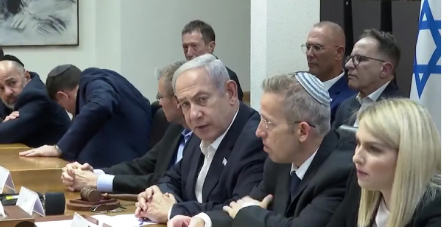Israel’s PM Opposes Ceasefire in Gaza:-
In the heart of the Middle East, where tensions simmer like tea over a flame, another chapter unfolds in the saga of the Israel’s PM-Palestine conflict. As the world watches with bated breath, recent developments reveal a stark reality: Israel’s Prime Minister, staunchly opposed to ending the war in Gaza, has convened his War Cabinet. This decision, resonating like a thunderclap across the region, marks a critical juncture in a protracted conflict that has claimed countless lives and tested the resilience of peace efforts time and again.
In the midst of swirling chaos and mounting casualties, the position taken by Israel’s PM leadership reverberates with profound implications. It’s a stance that demands scrutiny, analysis, and introspection. What drives this opposition to ceasefire amidst widespread international calls for de-escalation and cessation of hostilities?
To understand this pivotal moment, one must delve into the complex tapestry of historical grievances, geopolitical dynamics, and domestic imperatives that shape Israel’s policy calculus.  for the more information
for the more information
At the heart of Israel’s PM resistance to ceasefire lies a deeply entrenched sense of existential threat. For decades, the specter of terrorism has haunted Israeli society, manifested in suicide bombings, rocket attacks, and incursions across its borders. Gaza, a Hamas-controlled enclave teeming with militant factions sworn to Israel’s destruction, embodies this threat in its most palpable form. In the eyes of Israeli leadership, any pause in military operations risks emboldening these adversaries, allowing them to regroup, rearm, and launch deadlier assaults in the future.
Moreover, the calculus of Israeli politics cannot be divorced from the equation. In a nation where security concerns often dictate electoral outcomes, the Prime Minister faces pressures from within his own coalition to demonstrate resolve in the face of aggression. A perceived capitulation to ceasefire demands could undermine his credibility, embolden political rivals, and erode public trust—a risk few leaders are willing to take, especially in times of crisis.
Furthermore, the broader regional context casts a long shadow over Israel’s PM decision-making process. With Israel’s PM shadow looming large, and proxy conflicts playing out across the Middle East, the Israeli government views its actions through the prism of strategic deterrence. A decisive military response in Gaza, while fraught with risks and uncertainties, sends a clear message to adversaries and allies alike Israel’s PM will not hesitate to defend its interests, by force if necessary.
However, amidst the din of war drums and the clamor of geopolitical calculations, one must not lose sight of the human cost of conflict. Beyond the realm of policy papers and security briefings, there are real lives hanging in the balance—mothers cradling their children amidst the rubble, fathers burying their sons and daughters, communities torn apart by grief and despair.
For the people of Gaza, caught in the crossfire of geopolitical ambitions and historical animosities, the toll of war is measured not just in body counts, but in shattered dreams and fractured hopes. With each blast of artillery and whirr of drones overhead, their suffering echoes across borders and reverberates through the corridors of power in distant capitals.
In the face of such suffering, the imperative for peace becomes not just a moral imperative, but a strategic imperative as well. For every civilian killed, every home destroyed, and every child orphaned, the seeds of future conflict are sown, fueling a cycle of violence that knows no end.  for the more information
for the more information
In this crucible of conflict, the role of the international community looms large. From Washington to Brussels, from Cairo to Tehran, voices of reason and moderation must rise above the cacophony of war. Diplomatic channels must be kept open, ceasefires brokered, and humanitarian aid delivered without delay.
Ultimately, the path to peace in the Middle East is paved not with bombs and bullets, but with dialogue and compromise. It requires courage to break the cycle of violence, to transcend the grievances of the past, and to forge a future built on mutual respect and coexistence.
As Israel’s PM War Cabinet convenes and the guns of war continue to roar, let us not lose sight of the humanity that binds us all together. In the ashes of destruction, let us find the ember of hope—a hope for a tomorrow where peace reigns supreme, and the children of Gaza and Israel alike can dream of a brighter future.




